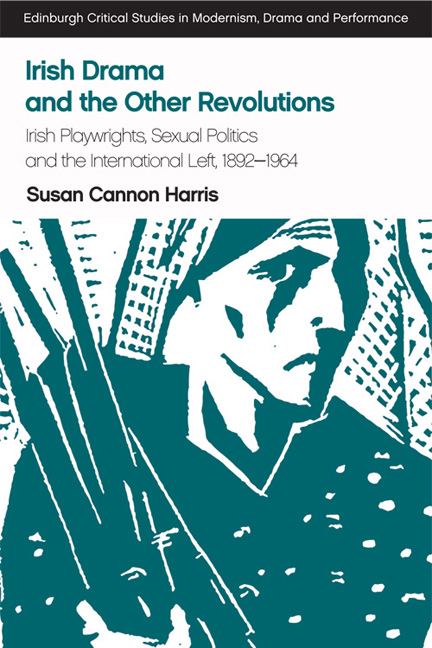 Irish Drama and the Other Revolutions
Irish Drama and the Other Revolutions Book contents
- Frontmatter
- Contents
- Acknowledgements
- Edinburgh Critical Studies in Modernism, Drama and Performance
- Introduction
- 1 Desiring Women: Irish Playwrights, New Women and Queer Socialism, 1892–1894
- 2 Arrested Development: Utopian Desires, Designs and Deferrals in Man and Superman and John Bull's Other Island
- 3 We'll Keep the Red Flag Flying Here: Syndicalism, Jim Larkin and Irish Masculinity at the Abbey Theatre, 1911–1919
- 4 Mobilising Maurya: J. M. Synge, Bertolt Brecht and the Revolutionary Mother
- 5 The Flaming Sunflower: The Soviet Union and Sean O'Casey's Post-Realism
- Epilogue: What The Irish Left – Sean O'Casey, Samuel Beckett and Lorraine Hansberry's The Sign in Sidney Brustein's Window
- Works Cited
- Index
5 - The Flaming Sunflower: The Soviet Union and Sean O'Casey's Post-Realism
Published online by Cambridge University Press: 06 January 2018
- Frontmatter
- Contents
- Acknowledgements
- Edinburgh Critical Studies in Modernism, Drama and Performance
- Introduction
- 1 Desiring Women: Irish Playwrights, New Women and Queer Socialism, 1892–1894
- 2 Arrested Development: Utopian Desires, Designs and Deferrals in Man and Superman and John Bull's Other Island
- 3 We'll Keep the Red Flag Flying Here: Syndicalism, Jim Larkin and Irish Masculinity at the Abbey Theatre, 1911–1919
- 4 Mobilising Maurya: J. M. Synge, Bertolt Brecht and the Revolutionary Mother
- 5 The Flaming Sunflower: The Soviet Union and Sean O'Casey's Post-Realism
- Epilogue: What The Irish Left – Sean O'Casey, Samuel Beckett and Lorraine Hansberry's The Sign in Sidney Brustein's Window
- Works Cited
- Index
Summary
INTRODUCTION
Sean O'Casey's place in the canon of modern Irish drama is secured by three plays known as the ‘Dublin trilogy’, all written and produced during the mid-1920s and all dramatising the effects of Ireland's revolutionary conflicts on the inhabitants of Dublin's slums. O'Casey's Shadow of a Gunman, Juno and the Paycock and The Plough and the Stars were phenomenally profitable for the Abbey, partly because O'Casey had created a fusion of realism and melodrama which was eminently accessible to middle-class and working-class spectators. But the plays on which his literary reputation now rests are the only three unambiguously realistic plays O'Casey ever wrote. After Yeats, Gregory and Lennox Robinson rejected O'Casey's experimental 1928 play The Silver Tassie, O'Casey settled in England, where he definitively rejected realism with his 1934 play Within the Gates. He pursued his quest for a new dramatic form until his death in 1964. We think of O'Casey as a disillusioned realist only because most of the work he produced after his break with the Abbey has dropped out of literary history. The plays O'Casey wrote after The Silver Tassie are rarely taught, seldom written about and almost never produced.
O'Casey's experimental phase has gone down the memory hole for two main reasons. The first is that O'Casey's experiments took him in directions directly opposed to some major trends in avant-garde theatre that have shaped our understanding of what constitutes good art. Though O'Casey claimed Shakespeare and Boucicault as his influences, what we see in his later work is the legacy of the loose and baggy maximalism invented by George Bernard Shaw for his first Irish play – the polar opposite of the stripped-down minimalism so successfully promoted by their compatriot Samuel Beckett. The result is that to contemporary readers, most of O'Casey's later work just seems … well … bad.
The second reason is that O'Casey's experimental phase is coeval with his left turn from the labour socialism of his Dublin days to a public embrace of the Communist Party and the Soviet Union.
- Type
- Chapter
- Information
- Irish Drama and the Other RevolutionsPlaywrights, Sexual Politics and the International Left, 1892–1964, pp. 169 - 212Publisher: Edinburgh University PressPrint publication year: 2017
